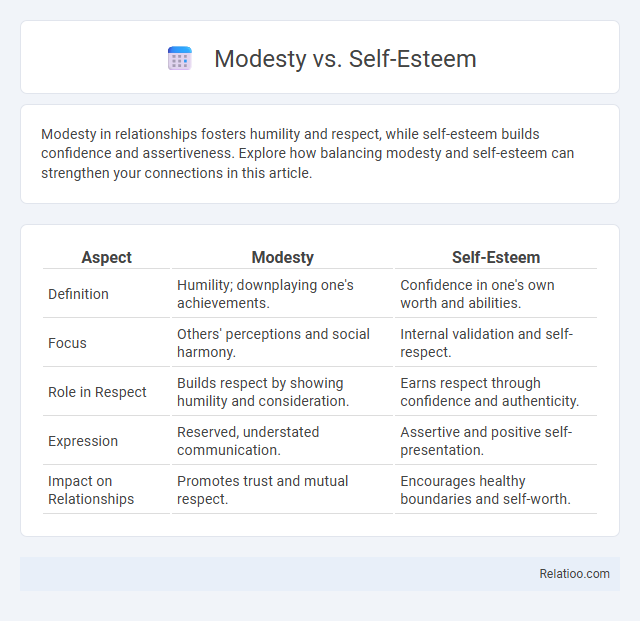Modesty in relationships fosters humility and respect, while self-esteem builds confidence and assertiveness. Explore how balancing modesty and self-esteem can strengthen your connections in this article.
Table of Comparison
| Aspect | Modesty | Self-Esteem |
|---|---|---|
| Definition | Humility; downplaying one's achievements. | Confidence in one's own worth and abilities. |
| Focus | Others' perceptions and social harmony. | Internal validation and self-respect. |
| Role in Respect | Builds respect by showing humility and consideration. | Earns respect through confidence and authenticity. |
| Expression | Reserved, understated communication. | Assertive and positive self-presentation. |
| Impact on Relationships | Promotes trust and mutual respect. | Encourages healthy boundaries and self-worth. |
Understanding Modesty: Core Definitions
Modesty refers to a humble view of one's importance, often expressed through reserved behavior and attire, distinguishing it from self-esteem, which centers on recognizing and valuing your own worth and abilities. Unlike pride, modesty avoids exaggeration of achievements or qualities, fostering genuine humility and respect for others. Understanding these core definitions helps you navigate social interactions with confidence balanced by discretion.
The Psychology Behind Self-Esteem
Self-esteem involves an individual's overall sense of self-worth and confidence, deeply influenced by psychological factors such as past experiences, social interactions, and internal self-perceptions. Modesty, distinct from self-esteem, reflects humility and restraint in expressing one's abilities or accomplishments, often rooted in cultural and social norms. Understanding the psychology behind self-esteem reveals how balancing modesty with healthy self-regard fosters emotional resilience and positive interpersonal relationships.
Cultural Influences on Modesty and Self-Esteem
Cultural influences significantly shape the expression of modesty and self-esteem, with collectivist societies often valuing humility and group harmony over individual achievement, thereby promoting modesty as a social norm. In contrast, individualistic cultures emphasize personal success and confidence, fostering higher self-esteem through self-promotion and assertiveness. These divergent cultural frameworks affect how individuals balance self-esteem and modesty, impacting interpersonal interactions and self-perception across different cultural contexts.
Modesty in Social Interactions
Modesty in social interactions fosters trust and respect by promoting humility and reducing arrogance, which enhances interpersonal relationships. Unlike self-esteem, which centers on one's internal sense of worth, modesty emphasizes outward behavior that avoids drawing excessive attention to oneself. Balancing modesty with healthy self-esteem allows individuals to present themselves confidently yet unpretentiously in social settings.
Self-Esteem: Positive and Negative Effects
Self-esteem significantly influences your mental health, shaping confidence and resilience while also posing risks when excessively high or low, leading to arrogance or insecurity. Balanced self-esteem promotes healthy relationships and effective decision-making by fostering self-respect and motivation without overconfidence. Understanding the interplay between self-esteem and modesty helps maintain humility without undermining your sense of worth, supporting overall psychological well-being.
Striking the Balance Between Humility and Confidence
Striking the balance between humility and confidence involves cultivating self-esteem without tipping into arrogance or excessive modesty. Modesty reflects an understated awareness of one's abilities, while self-esteem encompasses a healthy recognition of personal worth and accomplishments. Maintaining equilibrium ensures confidence is authentic, fostering respect from others while preserving genuine humility.
The Impact of Upbringing on Modesty and Self-Esteem
Upbringing plays a crucial role in shaping Your sense of modesty and self-esteem, as early family values and cultural norms influence how you perceive humility and personal worth. Parents who encourage balanced self-expression foster healthy self-esteem while promoting modesty, preventing extremes of arrogance or insecurity. The complex interplay between nurturing environments and social modeling significantly impacts the development of these traits throughout life.
Navigating Modesty in the Modern World
Navigating modesty in the modern world requires balancing humility with healthy self-esteem and confident self-expression. Your ability to maintain modesty while recognizing your worth fosters authentic interactions and personal growth. Understanding the distinction between modesty as restraint and self-esteem as self-respect helps you project sincerity without diminishing your value.
Building Self-Esteem Without Losing Humility
Balancing self-esteem and modesty requires nurturing your confidence while remaining grounded and humble, ensuring your achievements are acknowledged without arrogance. Building self-esteem involves recognizing your strengths and accomplishments, yet practicing modesty helps you stay open to growth and empathetic to others. Embracing humility alongside self-worth fosters authentic relationships and a resilient sense of self.
Practical Tips for Harmonizing Modesty and Self-Esteem
Balancing modesty and self-esteem involves recognizing your strengths without exaggeration or undue humility, fostering a realistic self-view grounded in facts. Practical tips include practicing gratitude for personal achievements, setting achievable goals to build confidence, and using positive self-talk that acknowledges worth without arrogance. Cultivating empathy and active listening also promotes humility while reinforcing healthy self-respect.

Infographic: Modesty vs Self-Esteem
 relatioo.com
relatioo.com